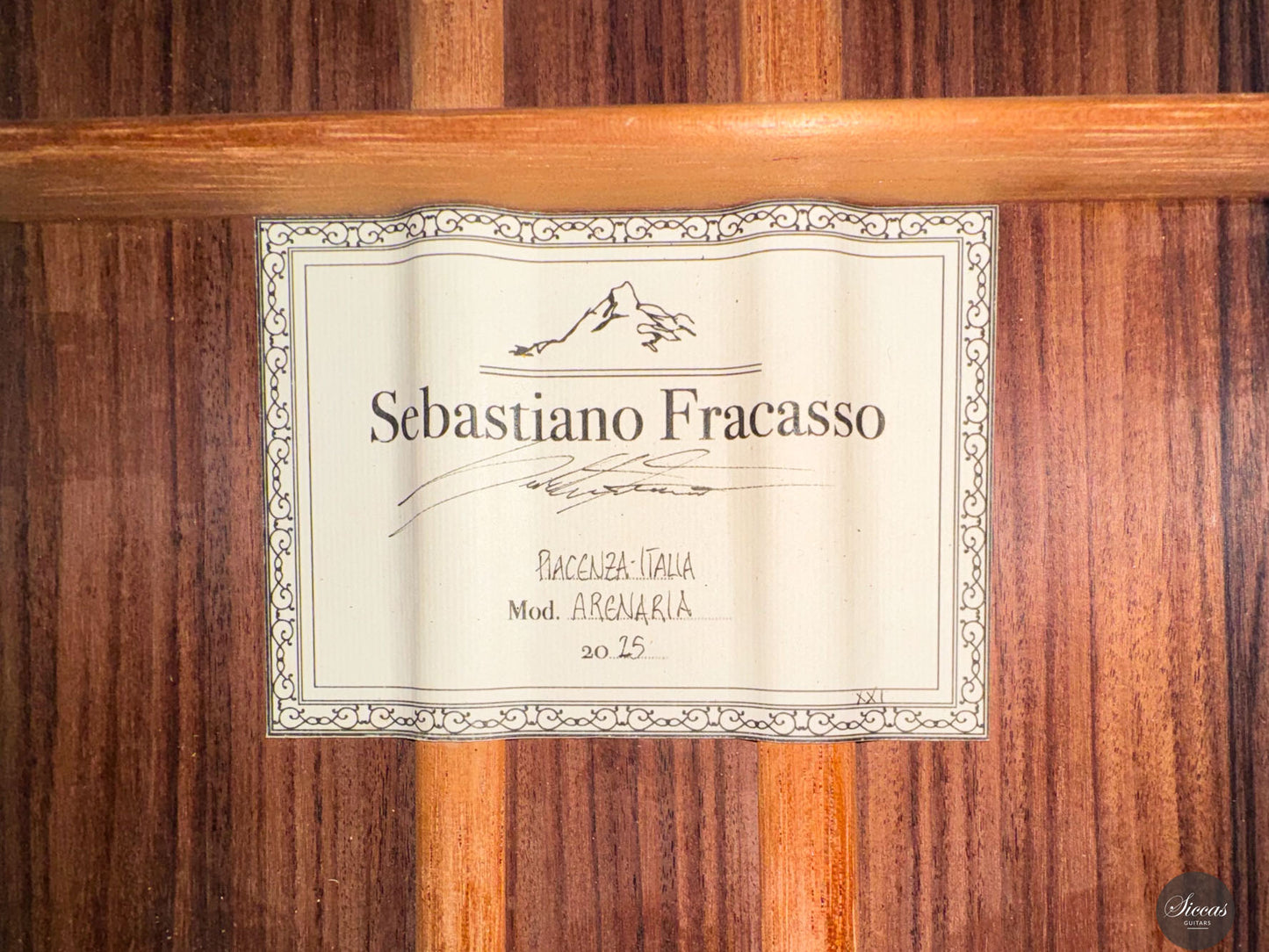Sebastiano Fracasso - 2025 Arenaria
Sebastiano Fracasso - 2025 Arenaria
Details
Details
Overview
Overview
Shipping important note
Shipping important note
Delivery times are typically reliable and most instruments arrive within the estimated timeframe.
Should any unexpected delay occur, our team will keep you informed and provide support at every step. For all shipping details and exceptions, please see our Shipping Policy.
Details about GPSR
Details about GPSR
























Video overview


More details about the guitar
About the luthier
Sebastiano Fracasso is an emerging Italian luthier whose guitars reflect a rare blend of conceptual depth and tonal clarity. Trained in the workshops of Ennio Giovanetti and Roberto De Miranda, his instruments carry forward a lineage of refined Italian craftsmanship. Fracasso's work stands out for its attention to structural detail, comfort, and expressive range. His artistic ethos often draws from natural and symbolic sources, weaving them into the identity of each guitar. The model "Arenaria" takes its name from the sedimentary rock sandstone, referencing both a primal human material and the luthier’s personal connection to nature through climbing. This metaphor of transformation — from raw matter into an expressive tool — shapes his entire approach to instrument building.
About the guitar
The 2025 "Arenaria" is a thoughtfully executed concert guitar, built with a top of 30-year-old naturally seasoned European spruce and South American Pau Ferro back and sides. This wood pairing, chosen for its lightness and tonal depth, results in an instrument with a notably low body resonance and a strong voice full of character. Its seven-fan bracing, inspired by Torres but reinterpreted through Fracasso’s own design experience, supports a vibrant response across the dynamic spectrum.
Tonally, the Arenaria presents a mellow, creamy voice with a fast and even response, particularly remarkable for a traditionally braced guitar. Each note emerges with clarity and immediacy, enriched by a full-bodied texture that makes the instrument particularly compelling in lyrical passages. The top seems to breathe with an organic vitality, resonating not just locally but across its entire surface. This results in a sound that feels both grounded and articulate, with a smooth bloom and refined balance. The expressive potential is high, offering both subtlety and strength without needing force from the player.
Fracasso approaches the design of the neck and fingerboard with equal care, selecting Spanish cedar and African ebony to ensure ergonomic comfort and tactile precision. Every detail — from wood grain orientation to the curvature of the profile — is refined with playability in mind. Alessi machines provide reliable tuning stability while maintaining a discreet visual presence.
More than an instrument, each Arenaria carries a unique artistic imprint. Inside this particular guitar, Fracasso included a handwritten quatrain by the 13th-century Persian mystic poet Rumi. Reflecting the luthier’s view of the guitar as a vessel for spiritual and emotional resonance, the poem speaks to openness, perseverance, and the intimate link between sound and prayer.
Farsi
این باد سحر محرم رازست مخسب
هنگام تضرع و نیاز است مخسب
بر خلق دو کون از ازل تا به ابد
این در که نبسته است باز است مخسب
Rumi’s Quatrain No. 90 (English Translation)
This dawn’s wind is confidant of secrets — sleep not
It's the time of pleading and prayer — sleep not
From the beginning to the end, across both realms of being,
This door, never closed, remains open — sleep not
Regular care extends the life of the instrument
Even with careful use, a classical guitar may gradually change in appearance or respond to unstable storage conditions. Have a close look at your guitar regularly and be attentif to changes. If your instrument is suffering from its environement, it will let you know.
Protect Your Guitar: Handle with Care
Be mindful when touching your instrument with greasy or unwashed hands: any skin contact is a small attack on the varnish. Of course, a guitar is made to be played, but taking a few precautions helps preserve its beauty: wash your hands before playing, wear long sleeves, and avoid unnecessary direct skin contact with the body of the instrument.
Pro tip: Avoid playing with a button-up shirt, heavy jewelry, or a belt, as these can scratch the guitar. Also, make sure your guitar case is free of any objects that could damage the instrument during storage.
String care
A good habit to adopt is wiping down your strings briefly after each playing session. This small action significantly extends their lifespan and helps maintain a consistent, comfortable feel under your fingers.
Most importantly, clean strings are essential for keeping your instrument in tune. Corrosion, sweat, and dust can affect the uniformity of the strings and interfere with accurate tuning across the entire fingerboard.
Pro tip: If you're having trouble getting your guitar in tune, it might be time to change the strings. A useful test is to compare the pitch of the 12th fret harmonic with the fretted note at the 12th fret; if there's an unusually large gap between them, your strings may have lost their integrity and should be replaced.
Keep Your Shellac Finish Shining!
Got a guitar with a shellac (French polish) finish? Here's a simple trick: Take a clean microfiber cloth and gently breathe on the surface to create a light mist. Then, softly rub to remove fingerprints, sweat, and grease. That’s usually all it takes to keep it looking great, no products needed!
Pro tip: Every few years, treat your guitar to a check-up with a luthier to keep it in top shape.
Storing Your Guitar: Climate Matters
Your guitar can safely stay outside its case, as long as the surrounding environment maintains 42–55% humidity and a temperature between 18–25°C.
Keep in mind that humidity levels can still fluctuate inside the case, especially during seasonal changes.
- Too much humidity may cause overtightened strings and a dull tone.
- Too little humidity can lead to a bulging top, string buzz, or even cracks.
Avoid placing your guitar near radiators, air conditioners, or windows with direct sunlight.
Pro tip: Always close your guitar case while playing. This helps preserve a stable microclimate inside the case, so your instrument is protected the moment you put it back in.



















































